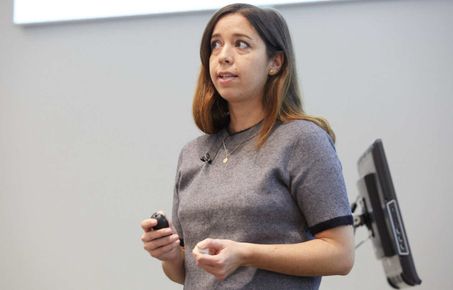
Imperial researchers have moved quickly to respond to the crisis, channelling their expertise to develop new vaccines and therapies, improve diagnostic tests, and strengthen epidemiology.
In total, 39 projects have been funded. These range from PPE for health care workers, investigating new treatments and developing new diagnostic devices. We are excited to share some of the projects supported by the COVID-19 Response Fund with you.
Thank you from our researchers

Dr Ana Luisa Neves, Institute of Global Health Innovation
“Donors' generous gifts were instrumental in allowing our research to take place. We were able to collect the perspectives of 6,000 patients across four countries (UK, Sweden, Italy and Germany) and assess their experiences of digital remote care.”

Dr Laure de Preux, Business School
“The funding has allowed us to look at a much-needed area of possible health inequalities during the crisis, by creating a small team to explore the question of how mobility restriction measures impact the most deprived individuals.”

Dr Dasha Nicholls, Department of Brain Sciences
“The generous support from the Response Fund ensures that our research on the mental health needs of front-line NHS and social care staff is effectively co-produced with those affected, listening to their voices and concerns.”
Ultrasensitive diagnostic device
--tojpeg_1590148065768_x2.jpg)
Professor Molly Stevens and the Stevens Group are developing a point-of-care diagnostic device that detects ultra-low concentrations of the COVID-19 virus, enabling much earlier diagnosis than all currently reported serological PoC tests. In recent work to develop a more sensitive HIV test that would allow earlier diagnosis of the disease, the Stevens Group used ‘nanozymes’ (enzyme-mimicking catalytic nanoparticles) to enhance the sensitivity, up to 100 times, of an existing diagnostic method known in the field as lateral flow immunoassay. The resulting diagnostic device allows the presence of HIV to be detected even when at a very low levels, which makes earlier diagnosis possible. This technology will be repurposed for COVID-19 diagnosis, delivering potentially gamechanging ultrasensitive performance that gives a simple readout in 15 minutes.
Investigating Health Inequalities
Dr Laure de Preux, from the Business School, is leading a project which aims to identify social and health inequalities across different socioeconomic groups during the COVID-19 pandemic. They are particularly interested in how compliance to mobility restrictions during social distancing and reopening phases, vary across geography, and socioeconomic status, and what the subsequent impacts on health are.
Building PPE for NHS workers
Imperial volunteers are making more than 50,000 disposable visors for Imperial College Healthcare NHS Trust hospitals. An 
entire floor of Imperial’s Translation & Innovation Hub (I-HUB) in White City has been converted to assemble the visors, which will support Trust staff on the front lines of the coronavirus crisis. More than 6,500 visors have already been delivered to Charing Cross Hospital. Tens of thousands more will be distributed across Trust hospitals over the coming weeks. The project is led by Imperial College Advanced Hackspace and the NIHR Health Protection Research Unit in Healthcare Associated Infections and Antimicrobial Resistance at Imperial, in partnership with the Trust and their Infection Control team. Together, they developed, optimised and evaluated the visors to ensure they were appropriate for use.
Achieving Social Distancing on Transport
Professor Dan Graham, from the Department of Civil and Environmental Engineering, is looking at ways to help achieve social distancing on public transport. Professor Graham will develop a simulation tool to test the effectiveness of various interventions, such as station restrictions, to help reach acceptable levels of social distancing.
Low cost emergency ventilator

A team of bioengineers and medics have designed a low cost, high performance emergency ventilator to help patients with coronavirus. The ventilator, called JamVent, has been designed so that it doesn't rely on specialist parts, but can perform the demanding tasks necessary for treating patients with COVID-19. The device could offer a solution for the shortages worldwide, particularly for health services in developing countries. The design has been made freely available for manufacturers and health services around the world to download.
Front-line Workers Mental Health
Dr Dasha Nicholls, from the Department of Brain Sciences, is investigating the short and medium-term psychosocial impact of the COVID-19 pandemic on NHS and social care-affiliated staff performance and wellbeing. The project will help better understand the rates of anxiety, depression, self-harm, suicide, and other mental health issues among front-line workers.
Join the Imperial Today mailing list
Be the first to hear about news, research and updates from across the College.
Thank you for supporting the COVID-19 Response Fund
Over 900 donors have given £610,000 to support research projects across the College. They are all working hard to find solutions and answer questions about COVID-19 and support the global fight against the pandemic.